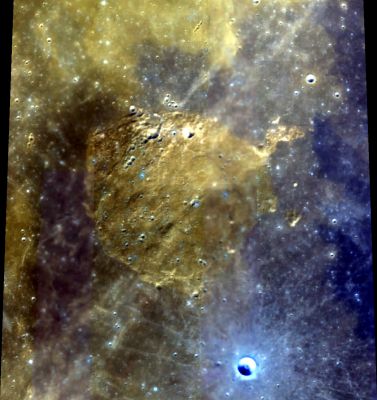Mons Rümker
Contents
Mons Rümker
|
Lat: 40.8°N, Long: 58.1°W, Diam: 70 km, Height: 0.48 km, Rükl 8 |
Images
LPOD Photo Gallery Lunar Orbiter Images Apollo Images
- AS15-97-13252 is a High-Resolution scan from Kipp Teague's online Apollo-15 gallery (Project Apollo Archive). Research: David Woods (Apollo-15 Flight Journal).
Maps
(LAC zone 23A4) LAC map Geologic map
Description
Description: Wikipedia
Additional Information
Depth data from Kurt Fisher database
- Cherrington, 1969: 0.48 km
Region of wrinkle ridges north of Rumker, at location 7/8-B on Chart 20 (page 53) in the 21st Century Atlas of the Moon (Wood/ Collins).
Nomenclature
- Named for Karl Ludwig Christian Rümker (May 28, 1788 – December 21, 1862), a German astronomer. His chief work was concerned with the cataloging of stars: a preliminary catalogue of the stars of the Southern Hemisphere was published in 1832 at Hamburg, and from 1846-1852 he published his great catalogue of 12,000 stars.
- According to Whitaker (p. 221), the name Rümker (which did not appear in Mary Blagg's Collated List) was introduced by Lee. It was inserted as Cat. No. 1881a in the IAU's Named Lunar Formations, where it was accompanied by two satellite craters (Rümker C and E) and one satellite peak (Rümker Beta).
- It is not entirely clear when, or by whom, the name was changed to Mons Rümker. - Jim Mosher
- It is a real mystery why the prominent dorsum southeast of Mons Rümker never received an official IAU-name. This dorsum runs from Mons Rümker to the bowl-shaped crater Nielsen. Danny Caes calls it Dorsum Nielsen-Rümker. Not a very original name, but... it's a NAME!
- Danny - this isn't really a mystery. Nearly every official IAU lunar dorsum name was adopted from a name assigned on an LTO chart (IAU Transactions XVIB, 1976), and the ridge you are referring to is outside the zone charted by the LTO's. Moreover, according to the IAU rules announced in the volume just mentioned, lunar dorsa can be named only after deceased earth scientists. Since neither Rümker nor either of the two Nielsen's for whom the latter crater is named were earth scientists, your proposed name could not be accepted. - Jim Mosher
- Curious W shaped formation at (approximately) 37° North/ 56°30' West, southeast of the bowl-shaped craterlet Rumker F. See lower part of Lunar Orbiter 4 frame 163-h2. Discovered by Danny Caes
- According to LPOD 2004-12-04, the region north of Mons Rumker is called the Telemann Formation, or Telemann Flows, Telemann Unit.
- Several small peaks in and around Mons Rumker received Greek letter designations (see Chart 6 and Chart 14 in the Times Atlas of the Moon). Rumker Alpha is located at the north-northeastern part of Mons Rumker's rim. Rumker Beta is located slightly southward of Mons Rumker's centre. Rumker Zeta is located at the northeastern part of Mons Rumker's rim. Rumker Theta is located slightly outside the eastern part of Mons Rumker. Two hillocks (Rumker Eta and Rumker Xi) are located east-southeast of Mons Rumker.
LPOD Articles
- Telemann Flows
- An Increasingly Complex Tale.
- A Mound of Bumps
- Volcanic Rump
- Fly me to the Moon Sheet 8
- Corner of Mystery
Lunar 100
L62: Large volcanic dome.
Bibliography
- Tran, T. et al (2011). Morphology of Lunar Volcanic Domes from LROC – 42nd LPSC Conference (Mar), 2011.
- Wöhler, C.; Lena, R.; Pau, K. C. (2007) The Lunar Dome Complex Mons Rümker: Morphometry, Rheology, and Mode of Emplacement, Lunar and Planetary Science XXXVIII, #1091.
- Wood, C.A. 3/2007. Odd Lunar Domes. Sky & Telescope 113(3):55-56
- Hill, Harold (1991) A Portfolio of Lunar Drawings, pages 92, 93.
- Smith, Eugene I. (1974) Rümker Hills: A Lunar Volcanic Dome Complex, The Moon, Volume 10, Issue 2, pp.175-181
